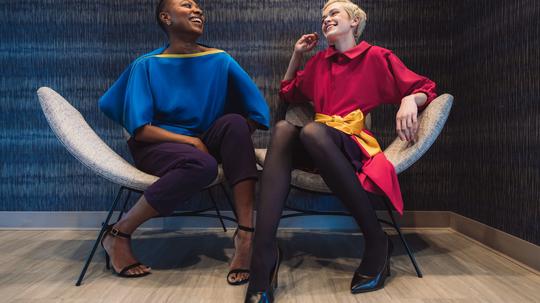
As the coronavirus spread globally this spring, non-essential businesses, including fashion retailers, closed, and many ceased their production lines. With retail stores closed, massive apparel companies withdrawing orders and the cancellation of fashion weeks in London and Paris, the global fast fashion market declined from $35.8 billion in 2019 to $31.4 billion in 2020.
In fast fashion, big brands churn out cheap products from the catwalk to the storefront as quickly as possible. The industry that produces 92 million tons of solid waste each year. With numbers like that, one Boston-area entrepreneur thinks it's time for fashion to slow down.
Shelly Xu, a designer and former creative lead at Instagram, incorporated her sustainable fashion startup, Shelly Xu Design, this year. Xu started the company as a response to the $406 billion fashion industry's harmful effects on the environment. Xu, who has a 15-year-old sister, wanted to create a fashion-forward solution before the industry, which produces about 10.5 million tons of textile waste in America a year, causes irreversible damage.
Her company designs, manufactures and sells sustainable women’s wear clothing through an online store with the goal in mind to “create beautiful, accessible, zero-waste clothing designs.”
But what is zero-waste design?
Zero-waste designs use as much of the textile as possible, without producing any unusable scraps of waste. Inspired by the Japanese kimono, Xu studied minimal design and production, which generated zero fabric waste.
“My zero-waste philosophy is that no matter how sustainable a piece of clothing is, if it doesn't get bought, if it doesn't get worn, it's just waste,” said Xu.
Her zero-waste philosophy is apparent in the sourcing and manufacturing of the startup. Shelly Xu Design sources its textiles from a New York City nonprofit called FABSCRAP. The organization takes upcycled fabric from interior designers, fashion designers or manufacturers and sells it, giving the fabric a second life.
When talking to potential manufacturers, the first question Xu asks is, “Can you produce zero-waste designs?” And if the answer is no, she walks away.
“We care so much [about ensuring] that what we do is truly zero-waste from not just no fabric waste, but also...so there’s no inventory waste,” Xu said.

The manufacturing process at Shelly Xu Design starts with the consumer. The team asks people for feedback on garment designs. Once they determine what customers want and will buy, the team takes those specific designs to the manufacturers. Xu avoids inventory waste by partnering with on-demand manufacturers, which won’t produce clothing unless it’s already been sold on their website.
“The model is different from how fashion today tends to work, where you buy bulk through the manufacturer," Xu said. "Usually, you put a crazy large down payment for many, many units...and a lot of times, not all the inventory gets sold, and that becomes waste."
Within the next five to 10 years, Xu hopes to bring manufacturing in-house, so her designs can be made from start to finish using automated garment manufacturing technology.
Shelly Xu Design also sets itself apart from other fashion startups by utilizing input from engineers.
“I design alongside engineers to think about [creating] clothing that is going to be easier to automate [and] they're going to be easier to scale,” Xu said. With engineers on her side, Xu aims to scale her zero-waste designs and avoid inventory waste.
Approximately 137 billion pounds of clothing are consumed globally every year. To Xu, this mass consumption of fast fashion is so tempting because it provides an adrenaline rush.
“For a very long time, fast fashion was considered really innovative, because it's able to keep up with the trends and demands that people have," Xu said. "To me, what's so harmful about fast fashion is it changes people's mindsets from having a few pieces that they love to having a lot of clothing that they probably won't need a month from now.”
The solution to fixing fast fashion won’t just be found within startups, though. Xu believes that a combination of startups’ innovation and fast fashion brands’ ability to scale will make sustainable clothing more accessible to a wider audience—not just to those who can afford it.
Sustainable clothes aren’t selling because of two factors: price and design. A report by e-commerce personalization platform Nosto showed that 52 percent of consumers want more sustainable practices within the fashion industry, but only 29 percent would pay more for sustainably made versions of the same clothing items.
“More than sustainability people cared the most about whether or not this clothing looks good on me, and whether or not I can afford it,” Xu said. “Today's sustainable fashion is often more expensive. And it doesn't look that exciting.”
Xu, a graduate of Columbia University, hopes to make her designs more accessible than most sustainable fashion retailers by bringing down the price of her garments. Currently, her clothes sell for around $300; she hand-makes and tailors all of the designs in her Harvard dorm room. Ideally, once the garments are scalable, they will be under $100 so more people can afford a piece of zero-waste design.
Shelly Xu Design is a part of this year's Harvard i-lab Summer Venture Program. Throughout the program, Xu will test the scalability of her designs using on-demand manufacturing.
If fashion is to slow down, there needs to be a fundamental societal shift “from having sustainable fashion as a compromise to having sustainable fashion as second nature for people," Xu said.
Correction: This article originally stated that Xu's sister is 17 years old rather than 15. We regret the error.








